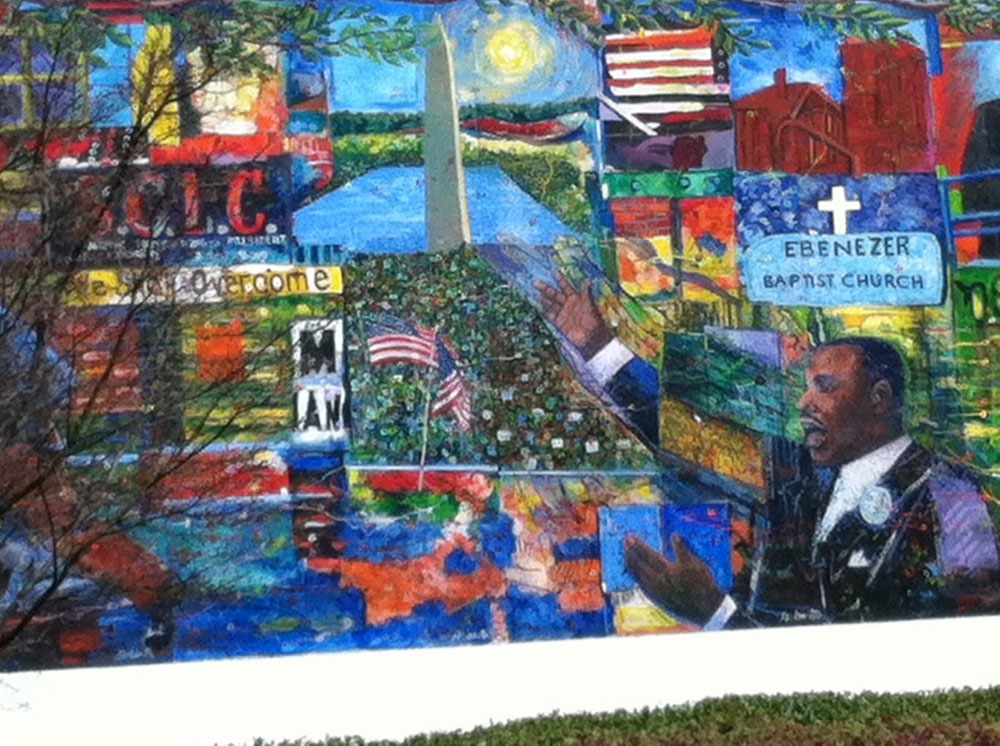
“History is not the past; it is the present. We carry our history with us. We are our history.”
—James Baldwin
My finger hovered over the screen as I stood in a voting booth at State Farm Arena—home of the Atlanta Hawks basketball team and Georgia’s largest polling precinct. I had stepped into the booth with my mask on and mind made up to exert my hard-earned right to vote and support my candidates, but I pondered my decision.
My mind drifted to the numerous “get out the vote” (GOTV) mailers, emails, text messages, robocalls, and surveys I had received since the summer. I also thought about the 10 years of electoral engagement and organizing that my group, Partnership for Southern Equity (PSE), and countless others had done to advance a values revolution in Georgia.
I thought about the ridicule, and about the sacrifices we all had made to elevate and mobilize the voices of the disenfranchised while awakening the hearts of those who had chosen to sit on the sidelines for justice. It was at that moment I knew that change was coming to Georgia, and eventually the American South. I knew in my heart that the third Reconstruction had begun—a reconstruction that would not only transform the political composition of our body politic, but the moral compass of Georgia and the nation.
Even though this pattern of thought took seconds and I quickly cast my vote, it was clear that I had brought more with me into the voting booth than I had anticipated. What I brought were the hopes and dreams of an entire movement whose infrastructure has been built over centuries.
While some may focus on the election of Joe Biden and Kamala Harris as the 46th president and 48th vice president of the United States, we must not allow this moment to cloud the collective memory of our nation. We must not allow the destination to overshadow the journey.
We honor and celebrate the hard work of Stacey Abrams and Black women–led organizations like The Peoples’ Agenda, Fair Fight, Black Voters Matter, and New Georgia Project. From their collective efforts, along with organizations like PSE, the nation witnessed the emergence of an ecosystem—an “equity ecosystem”—that moved Georgia toward change even though most white Georgians resisted, with an estimated 70 percent of voting white Georgians casting their ballots for Donald Trump. By way of tenacity, strategy, and love, these organizations have shown the nation what is required to realize a “New South” and a new nation.
Growing a movement over time
We have been here before. The racism of low expectations minimized the opportunity of our nation to learn from the genius displayed by Dr. Martin Luther King, Jr., Congressman John Lewis, Fannie Lou Hamer, Ella Baker, Hosea Williams, and other known and unknown patriots of the Southern Civil Rights Movement. Tactical wins in Birmingham, Selma, and other places around the South have been framed in our public consciousness as historic events that succeeded by sheer luck or, at best, divine intervention. In many ways, after Dr. King’s assassination, the nation turned its collective back (and support) on the work for justice in the American South that has continued with minimal resources till this day.
While we were invisible to the nation, we continued to honor the legacy of our ancestors. We continued to fight, even when national foundations and the media discounted us. We did what we always do: From the depths of our own community, we worked, we organized, we failed forward, and we won. We took the daily discussions around our kitchen tables, as we managed how to survive, and turned them into power. That same power is now evident in the deep grassroots networks that Biden and Harris counted on to carry the state of Georgia, as part of their triumphant campaign to win the highest offices in the land.
For almost a decade, PSE has worked with this network of frontline organizations and other diverse allies to grow an ecosystem of leaders and organizations that have chosen to stand up collectively for racial equity in Georgia and beyond.
The value-based organizing approach that we and others have employed, coupled with leadership development, research, strategic communications, and policy advocacy efforts, have helped to develop the part of the civic iceberg—the mental models and structures and assumptions that we often fail to see—that was underwater. This is the part of the work that most don’t see with the naked eye or with the latest headline. We will continue to work until the values of inclusion, regeneration, and justice are central pillars of policymaking in the American South. While some may doubt us, I humbly speak for my friends in the Southern equity movement when I say, we are not done!
Sign up for our free newsletters
Subscribe to NPQ's newsletters to have our top stories delivered directly to your inbox.
By signing up, you agree to our privacy policy and terms of use, and to receive messages from NPQ and our partners.
What you can do, and what we don’t want you to do
James Baldwin said, “History is not the past; it is the present. We carry our history with us. We are our history.” It is my hope that philanthropy and others will take the time to learn from the lessons of the civil rights movement and the lessons we are communicating in Georgia today. The change you seek to support will not come in a grant cycle.
Change will come from a long-term commitment to supporting and strengthening the organizations that are closest to the people that are hurting the most. The journey toward transformational change will require funders to challenge their conscious and unconscious biases about Black-led organizations. Change requires larger, well-resourced white-led organizations to sit at the table of the organizations they usually recruit for grants but with little respect for their resilience and brilliance. It will require the development of strong institutions as well as strong leaders.
I was thankful when I saw Abrams’ tweet (below) asking for a roll call of organizations “in the trenches” for change. While the light shined on her, she chose to elevate other organizations and leaders.
As the leader of one of those organizations, during times of celebrating others’ long-time-coming victories, I find myself wondering, will the South be forgotten again? Will the hard-fought gains realized in Georgia be attributed to luck? Or will key stakeholders and the public finally realize the destiny of America is inextricably linked to the destiny of the South. Only time will tell.
Regardless of the answers to the questions I have asked, frontline leaders in the South will continue to build until, as Dr. King said, “justice rolls down like waters, and righteousness like a mighty stream.”
Georgia, let’s shout out those who’ve been in the trenches and deserve the plaudits for change.
— Stacey Abrams (@staceyabrams) November 6, 2020
The incoming Biden-Harris administration has listed racial equity as one of the top four priorities of the transition team. That did not just happen on Monday. That simple prioritization was the result of more than 400 years of oppression of enslaved Africans and their descendants; countless Black, Brown, and Native lives lost since conquistadors and their ilk started hunting for gold in the Americas; and people saying enough is enough in the streets, in the economy, and in the voting booth repeatedly.
We are our history. As the nation and funders celebrate or cringe, depending upon what side you’re on, we must remember that the fight for the soul of America is a multi-round contest that started centuries ago with knockouts and comebacks all along the way. As 2020 brings another shift to funding priorities, this is how we invite funders to engage with us:
- Continue to support get-out-the-vote (GOTV) campaigns that enable our communities to overcome blatant efforts at voter suppression.
- At the same time, it’s critical to support grassroots organizing, narrative change work, leadership development, and coalition building without which GOTV efforts, though important, will fall short.
- Come with a spirit of contribution. This is our work, and you’re coming to support, not instruct.
- Dig deep on the issues that matter most to your community and support the organizations that are moving agendas forward. Votes can change policy that affect said issues.
- Raise up voices from the kitchen table/communities most impacted to gain the right perspective. The best way to combat misinformation is with the truth.
No singular issue or intervention wins an election, no matter what the pundits say. It really boils down to who can speak to the real lives of the American people. Funding an ecosystem approach, instead of jumping from issue to issue, guarantees maximum reach without siloes trying to claim credit that their issue was the one that carried us all over the finish line.
We won together. And working together, we will continue to move forward.












